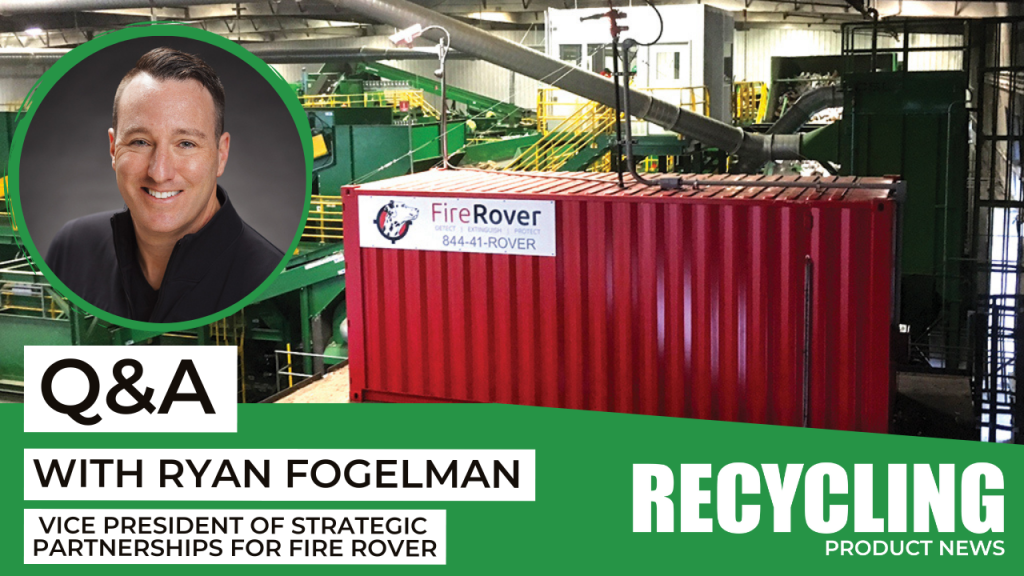Q&A: Ryan Fogelman on safety hazards, industry challenges & fire prevention systems in action

In an industry where the convergence of combustible materials and recycling processes can create countless potential hazards, fire safety is a paramount concern for recyclers. The recycling industry, with its complex blend of materials and equipment, is particularly vulnerable to fire outbreaks, especially as electronic waste continues to find its way into waste streams.
I caught up with Ryan Fogelman, vice president of strategic partnerships for Fire Rover, to discuss the hazards inherent in recycling operations, the innovative strategies aimed at preventing and managing these incidents, and how advanced fire detection and prevention systems - like those pioneered by Fire Rover - have made strides in protecting recycling facilities.
Slone Fox: What are the most common fire hazards specific to the recycling industry, and how does Fire Rover address them?
Ryan Fogelman: I typically break the fire hazards into two types. The first is traditional hazards, which are hazards that have been in our waste and recycling streams since the beginning of time with the risk of being the cause of or accelerant to fires and explosions. Those hazards include propane tanks, fireworks, pool chemicals, paint thinner, aerosol cans, and more. The second is electronics, which are personal storage and/or personal electronics with batteries in them, including but not limited to lithium-ion batteries.
SF: Can you share an example of how Fire Rover's fire detection and prevention systems have prevented or minimized fire incidents in recycling facilities?
RF: At Fire Rover, we have prevented or minimized thousands of fire incidents at our clients' facilities since we installed our first solution in 2015. The graph [Figure 1] shows our scorecard for 2022. During that year, we had about 300 to 350 facilities protected with one of our solutions: the Fire Rover box, OnWatch solution, or Continuous Flow solutions. Of the hundreds of thousands of alarms, we saw 2,880 confirmed fires or hot spots. Of those confirmed events, we pressurized our system for 12 percent of the incidents and called first responders and/or actively suppressed the fire with our remotely operated solutions.
The fact is we have not had a catastrophic loss that has started in an area that we protect. We also have never had a false alarm. I don't want to say that what we do is easy, because there are a ton of moving parts to our solution, but with our track record of currently protecting more than 500 waste and recycling facilities, we can make a pretty good case to our clients' insurance companies that having a Fire Rover solution is far better than the alternatives to achieve good results.
Personally, I follow the Volvo school of thought where safety knows no competition. That said, some of our customers allow us to share their videos to help educate other operators about the hazards they are seeing on the front lines. We have a Fire Rover YouTube channel where we share the videos that we can share.
SF: In your experience, what are the key challenges in promoting fire safety awareness among recycling facility operators and workers?
RF: Promoting any solution that solves a safety problem inherently gets a lack of internal attention because it is not revenue-generating. Even solutions like the Fire Rover that are about cost avoidance and have other savings, including "fire watch" replacement, lower insurance premiums, and mitigating the risk of a major loss and operation downtime, have an uphill battle in proving to the industry that the juice is worth the squeeze.
SF: What are the most important measures recycling facilities should take to minimize the risk of fire outbreaks?
RF: First, we need to educate the public on the dangers of improperly disposing of items that cause fire hazards in the waste and recycling streams. However, you can only educate your way out of the curbside recycling side of the equation. Construction and demolition, scrap metal, hazardous materials, and electronic recycling facilities are dealing with the risk of fires first-hand. They need back-end training for their employees on how to properly remove these hazards from the stream, how to deal with a potential fire hazard, and how to properly fight these fires when one occurs. Fire professionals also need proper equipment and training to safely respond to these types of fire hazards when one occurs.
The reality is these fires happen quickly and are powerful. For example, one bike battery can have the power of three grenades and release toxic gases that no one without the proper equipment should be fighting. They should only be evacuating as fast as possible. This is why the Fire Rover solution has been so successful. We not only detect fires early, but we get professionals to the scene quickly, and we fight the fire during the critical first minutes of an event targeted to the hazard and response needed.
SF: How do you envision the future of fire safety in the recycling industry, and what improvements can still be made?
RF: We need to do audits of incoming material and presort the potential hazards out of the recycling stream. The key is that it needs to be as fast or faster than auditing or sorting is done today. I am sure there will come a day when we will be able to scan at the curbside or before processing to ensure potential fire risks are removed prior to processing the material. We are currently seeing some progress on robotic sorting lines, and I am sure technology will catch up to this at some point in the next few decades. But until then, we need to ensure we all do what we can to protect the waste and recycling operators by doing our part to be part of the solution and properly recycling and disposing of our potential fire hazards.
Ryan Fogelman, JD/MBA, is vice president of strategic partnerships for Fire Rover. He compiles and publishes Reported Waste & Recycling Facility Fires In The US/CAN as well as the Waste & Recycling Facility Fires Annual Report.
Company info
6960 Orchard Lake Road, Suite 303
West Bloomfield, MI
US, 48322
Website:
firerover.com
Phone number:
844-417-6837



